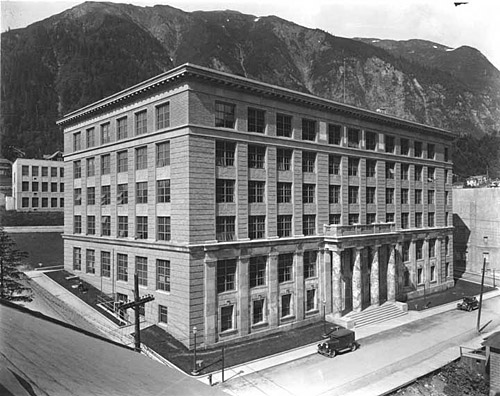100 Years of Alaska's Legislature
"From Territorial Days to Today"
2021 - 2022
Juneau, Alaska
32nd State Legislature
Pandemic Fallout Continues, Decisions Must Be Made.

Session Information
Senate Members
House Members
The Covid Pandemic Delayed Many Important Legislative Decisions
The Covid-19 pandemic that began in 2020 continued to wreak havoc on global health, economies, and societal functions throughout the two-years of the Legislature. Despite the Legislature offering members and staff testing for the virus and maintaining safety practices to avoid infection, numerous people working in the Capitol Complex contracted the illness, increasing the challenges of the sessions.Entering the 2021 regular session, substantial divisions among legislators and with Governor Dunleavy over numerous issues carried over from the previous Legislature. Primary among these was how to divide revenues between government services and Permanent Fund Dividends (PFDs), the lack of a long-term fiscal plan, and multi-year disagreements on reforming criminal justice laws. In addition, the House membership, comprised of 21 Republicans, 15 Democrats, and four Independents, struggled to organize a majority. Representative Louise Stutes was ultimately elected to serve as Speaker, presiding over a multi-partisan bare majority of 21 members, on February 16th—nearly a month after the session began.
With the legislative majority and governor deadlocked over the operating budget and PFD, a shutdown of state government was narrowly averted with the passage of a budget during a special session in late June. Further work on budgets and the amount of the PFD forced a total of four special sessions over 96 days, with the last finally concluding in early November.
The improvement in 2022 of global economies from crises caused by Covid-induced lockdowns, supply chain disruptions, and the invasion of Ukraine by Russian forces in February caused oil prices to increase rapidly in the first half of the year. That, combined with strong investment returns for the Permanent Fund in 2021, eased state revenue constraints. As a result, budget negotiations were notably less contentious compared to recent years. Although negotiations over the amount of the PFD were nonetheless difficult, the dividend of roughly $2,621, combined with an “energy relief” payment from the fund of $662, provided all eligible Alaskans a check of $3,284, marking the highest such payout in the history of the fund.
A bipartisan, bicameral committee was established in 201 to generate a long-term fiscal plan. It ultimately agreed on recommendations, marking a significant display of bipartisanship. Although the plan was not immediately adopted, the group’s work exists as a starting point for future legislatures.
Beyond the Legislature
The U.S. experienced a difficult transfer of power for the first time in its history when President Trump questioned the results of the 2020 election culminating in portions of a crowd of the president’s supporters illegally entering the U.S. Capitol on January 6, 2021, Numerous countries were simultaneously facing antidemocratic movements, and elected governments fell to coups in Myanmar, Chad, Mali, Guinea, and Sudan.
Following a deal initially struck between President Trump and the Taliban in Afghanistan, President Biden ordered a complete withdrawal of U.S. troops from the country to be concluded no later than September 11, 2021—exactly 20 years after the terrorist attacks of 9/11.
Plagued with scandals, United Kingdom Prime Minister Boris Johnson resigned in July 2022. His successor, Liz Truss lasted just 45 days in office before being forced out—the shortest tenure in British
SPEAKER OF THE HOUSE
Louise Stutes
SENATE PRESIDENT
Peter Micciche